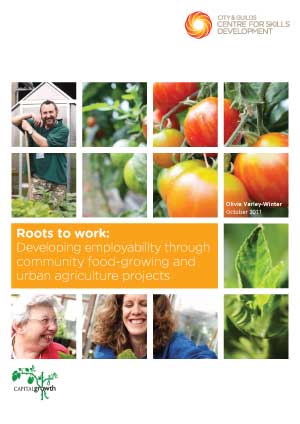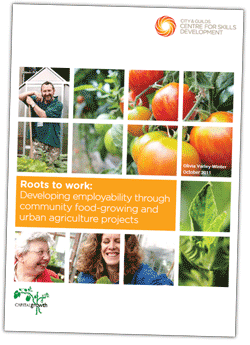
Roots to work: Developing employability through community food-growing and urban agriculture
63pp - 2012 | 2110Kb

Roots to work: Developing employability through community food-growing and urban agriculture
63pp - 2012 | 2110Kb
 Published by the City & Guilds Centre for Skills Development and Sustain's Capital Growth, this research report shows that urban food growing is an effective route to employability.
Published by the City & Guilds Centre for Skills Development and Sustain's Capital Growth, this research report shows that urban food growing is an effective route to employability.
Community food-growing groups and other urban agriculture projects can provide community-based learning and training opportunities, and are an effective way to develop employability for people, particularly those who face difficulties in finding and keeping work. The report identifies the support that projects need to develop employability among their participants.
Community food-growing projects, city farms and other urban agriculture initiatives in London already reach people who are facing particular difficulties with their employability: out of the 23 London agriculture groups interviewed, 20 include people experiencing unemployment and/or facing difficulties including physical or mental disability, addiction issues, homelessness, English language barriers, and long-term unemployment. 12 out of the 23 projects were purposefully reaching people in one or more of these situations, with the aim of helping them. They also help supported individuals at difficult times in their lives.
This report looks at how urban agriculture develops the skills and attributes that people need to develop to improve their chances of getting and staying in employment by:
Report contents
Foreword
Acknowledgements
Executive Summary
Section 1: Introduction
Section 2: Confidence and social support
Section 3: Transferable skills
Section 4: Technical skills and formal qualifications
Section 5: Getting into work
Section 6: Conclusion and recommendations
References
Further resources: Urban agriculture project details
Capital Growth: We believe everyone should have the opportunity to grow food as part of a healthy, resilient food system and we are working with our network of growers in London to make this happen.
Sustain
The Green House
244-254 Cambridge Heath Road
London E2 9DA
020 3559 6777
sustain@sustainweb.org
Sustain advocates food and agriculture policies and practices that enhance the health and welfare of people and animals, improve the working and living environment, promote equity and enrich society and culture.
© Sustain 2024
Registered charity (no. 1018643)
Data privacy & cookies